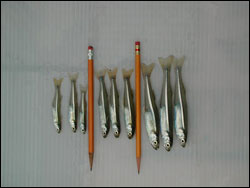The year 2005 may have been the warmest year in a century, according to NASA scientists studying temperature data from around the world.
Climatologists at NASA’s Goddard Institute for Space Studies (GISS) in New York City noted that the highest global annual average surface temperature in more than a century was recorded in their analysis for the 2005 calendar year.
Some other research groups that study climate change rank 2005 as the second warmest year, based on com

UCR graduate student leads research showing how evolution slows recovery of fish population
The practice of harvesting the largest individuals from a fish population introduces genetic changes that harm the overall fish population, a UC Riverside graduate student and colleagues have determined. Removing the large fish over several generations of fish causes the remaining fish in the populations to become progressively smaller, have fewer and smaller eggs with lower survival and g

Biologists have long believed that bigger is better when it comes to body size, since many lineages of animals, from horses to dinosaurs, have evolved into larger species over time.
But a study published this week by two biologists at the University of California, San Diego in an early online edition of the Proceedings of the National Academy of Sciences suggests that maxim, known as “Cope’s Rule,” may be only partly true.
The scientists found that populations of tiny
New research shows that global climate processes are affecting southern right whales (Eubalaena australis) in the South Atlantic. A thirty-year study by an international team of scientists found a strong relationship between breeding success of whales in the South Atlantic and El Nino in the western Pacific. The results are published this week in the On-line journal Biology Letters.
Southern right whales migrate from the South Atlantic to the Southern Ocean to feed. Scientists
This Sunday morning (15th January) at 10.12 am GMT a capsule containing dust from Comet Wild 2 will return to Earth landing in the Utah Desert near Salt Lake City. The landing of the capsule marks the return of NASA’s Stardust mission which has been on a three billion-mile trip to collect pristine cometary material and interstellar dust. After their collection samples will be distributed to a limited number of specialist research teams. Four UK institutions have been invited to be part of the
Climate modelers at the Goddard Institute for Space Studies (GISS) have succeeded in reproducing the climate changes caused by a massive freshwater pulse into the North Atlantic that occurred at the beginning of the current warm period 8,000 years ago. Their work is the first to consistently model the event and the first time that the model results have been validated by comparison to the record of climate proxies that scientists regularly use to study the Earth’s past.
“We only